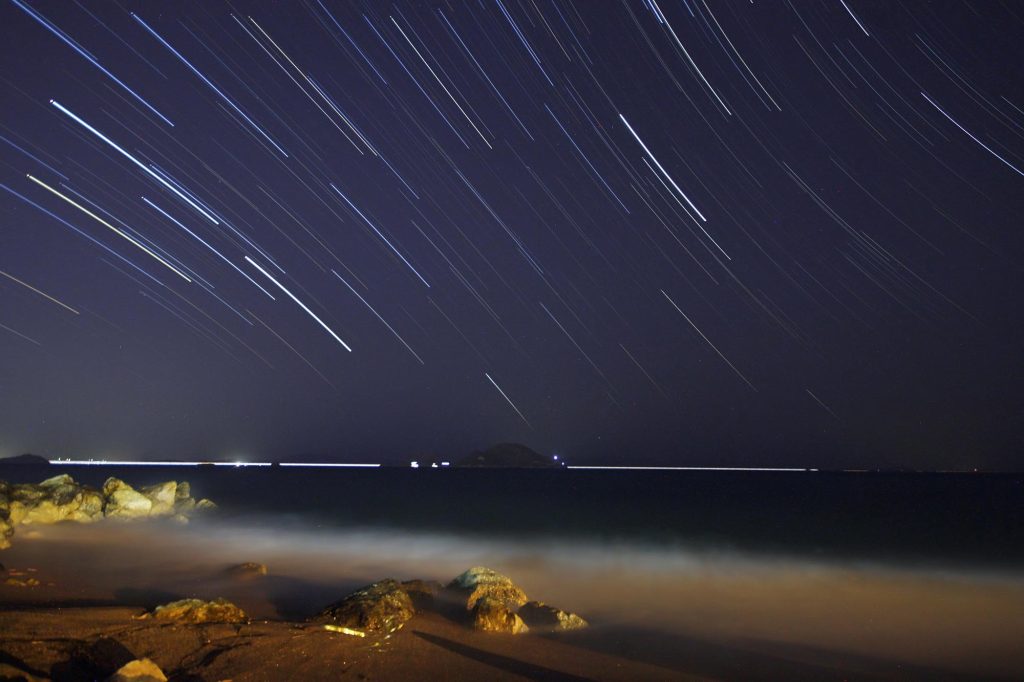
Ini sering membawa salah satu hujan meteor tahunan yang paling terlihat di langit malam Bumi, dan akan mencapai puncaknya pada 12 dan 13 Agustus. Biasanya, ia menyajikan 50-100 “bintang” per jam pada puncaknya, menjadikannya pertunjukan yang mengesankan. Hanya ada satu masalah tahun ini: bulan purnama.
“Sayangnya, puncak Perseids tahun ini akan melihat kemungkinan kondisi terburuk bagi pengamat,” katanya.[{” attribute=””>NASA astronomer Bill Cooke, who leads the Meteoroid Environment Office at NASA’s Marshall Space Flight Center in Huntsville, Alabama. “Most of us in North America would normally see 50 or 60 meteors per hour,” he said, “but this year, during the normal peak, the full Moon will reduce that to 10-20 per hour at best.”
Because the Moon is so much brighter than anything else in the night sky, it will wash out all but the very brightest Perseids as they streak through our atmosphere and burn up far overhead.

A shower of Perseid meteors lights up the sky in 2009 in this NASA time-lapse image. Credit: NASA/JPL
As the full Moon subsides, the Perseids will begin to weaken around August 21-22 and cease completely by September 1. They’re the debris remnants of Comet Swift-Tuttle, a lumbering “snowball” composed of ice, rock, and dust, which orbits our Sun every 133 years. The comet itself was last visible to us in 1992 and won’t pass our way again for over 100 years: not until 2125.
How far back sightings of the Perseids actually go remains a matter of some disagreement, Cooke said. The comet itself wasn’t identified until 1862, but the meteor shower was seen over medieval Europe. The annual event came to be known as “the Tears of St. Lawrence,” named for the last of seven Roman church deacons martyred by the emperor Valerian in August of the year 258.
So, while this is probably not the best year to make a special trip in order to see the Perseids, if you find yourself outside between midnight and dawn on August 13, don’t forget to look up anyway. Because you never know – you might just catch one of the bright Perseid meteors that defies the glare of the Moon. Also, be aware that the occasional early Perseid can streak across the sky as much as a week beforehand.
If you want to know what else is in the sky for August 2022, check out the latest “What’s Up” video from Jet Propulsion Laboratory:
Apa saja yang menarik dari skywatching di bulan Agustus 2022? Pemandangan harian empat planet dengan mata telanjang berakhir pagi ini. Tetapi masih ada banyak fitur hebat, terutama jika Anda memiliki akses ke teropong. Plus,[{” attribute=””>Saturn and Jupiter are returning to nighttime skies! The outlook for the Perseid meteors isn’t great due to a full moon on the peak night of August 12, but still it’s worth keeping an eye out for early Perseids after midnight the week before. And August is a great month to learn an easy-to-spot constellation – Cygnus the swan.

“Geek tv yang sangat menawan. Penjelajah. Penggemar makanan. Penggemar budaya pop yang ramah hipster. Guru zombie seumur hidup.”






More Stories
Jejak kaki dinosaurus yang identik ditemukan di dua benua
Kapan para astronot akan diluncurkan?
Perjalanan seorang miliarder ke luar angkasa “berisiko”